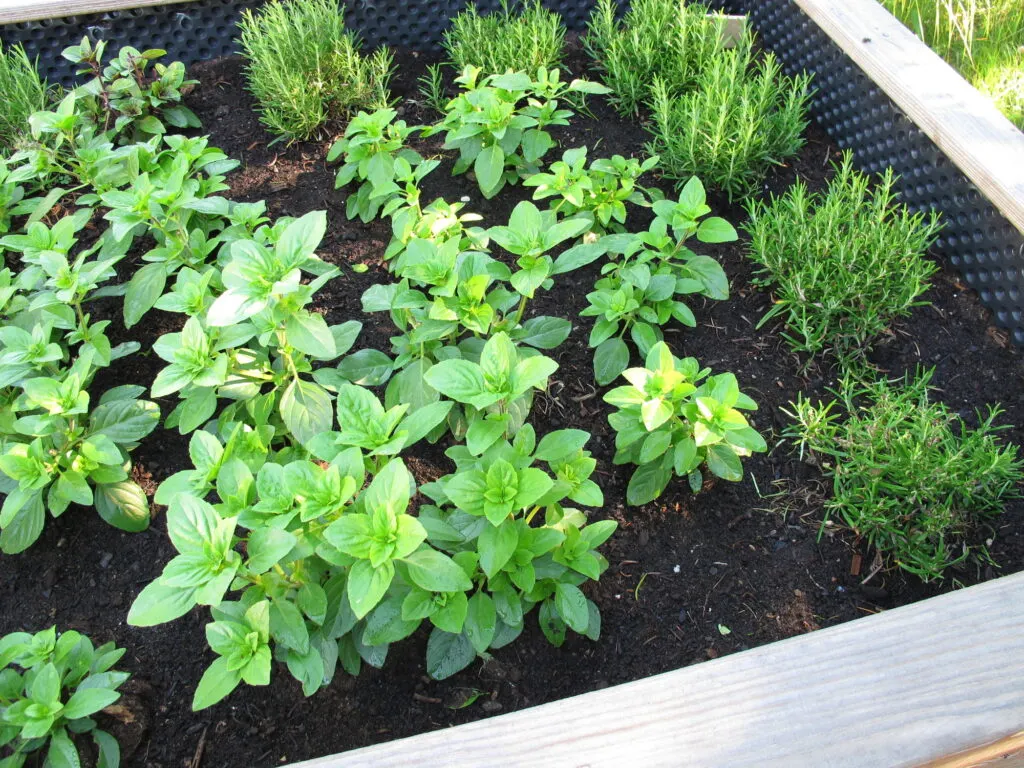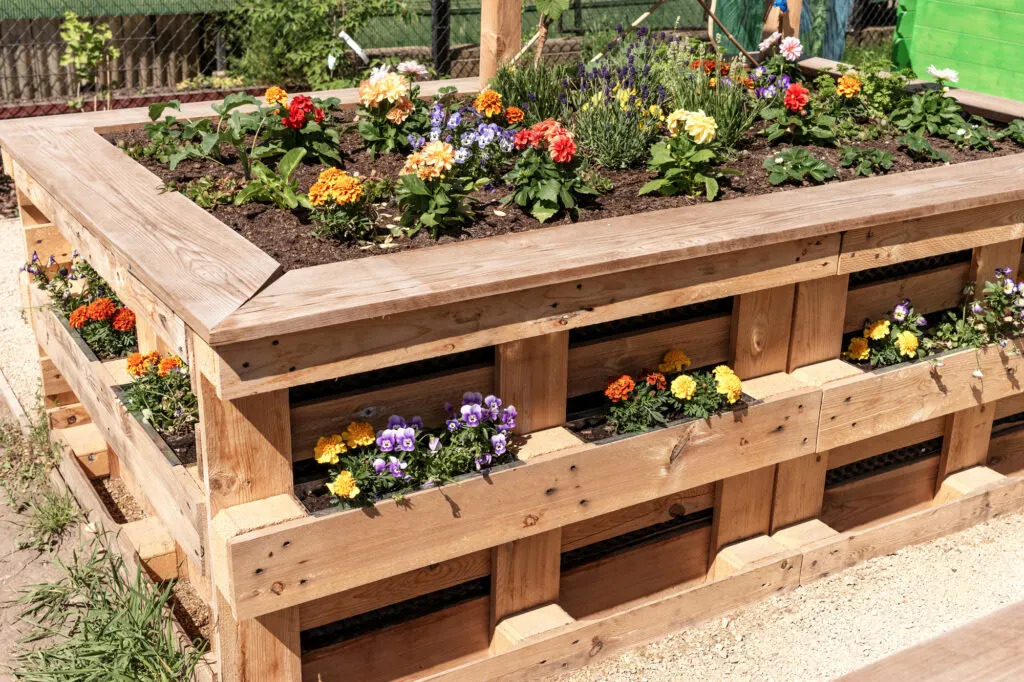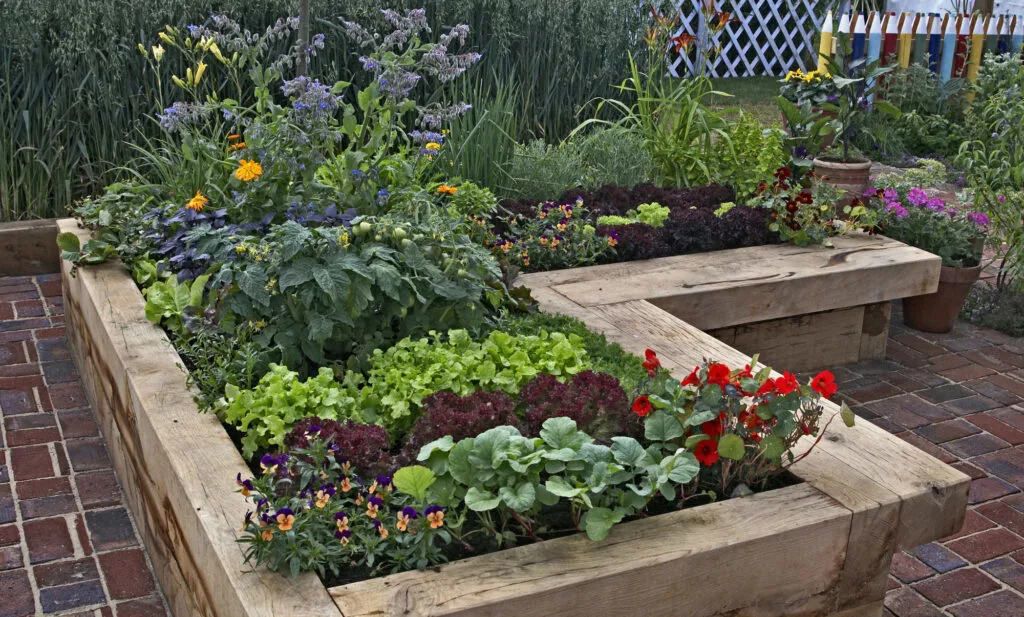Raised garden beds are often something you see at show gardens or stately homes. Elevating plants by a few inches seems to produce impressive results, particularly when managed properly. Flowers grow taller and stronger, and plants seem to grow denser with even the sickliest of species thriving.
The reason for this has to do with the simple benefits that raised beds offer. Instead of asking plants to grow on flat soil, lifting them up a little bit seems to work wonders for their health (in most cases, that is).

The purpose of this post is to explain some of the benefits of raised garden beds and how they can help you build the garden you want. These raised structures above the soil are like permanent nurseries, giving species optimal growing conditions to help them thrive. Moreover, they also protect the quality of your soil, enabling you to keep your garden looking fresh and beautiful for decades to come.
So, what are the actual benefits of raised beds for plant and soil health? Let’s take a look.
Easy To Customize
One of the biggest benefits of raised beds is how easy they are to customize. You can build them to various heights using whatever materials you have available. You can also paint them or leave them looking natural, depending on your preferences.
For this reason, raised beds are a good addition to any garden. They let you personalize the aesthetics to suit your style, regardless of the plants growing in them.
Raised beds are also ideal for bijou and other types of small gardens. They enable you to make the best use of a compact space, allowing you to explore it and see what works for you.

Increases Crop Yield
Another big benefit of raised beds is that they increase crop yield, or the amount of plant matter you can grow in a particular patch of land. This benefit isn’t particularly helpful for people who want aesthetic gardens, but it can be a godsend for anyone with a vegetable patch. Raised beds let you grow more cauliflower, carrots, and onions than virtually any other method.
Researchers have pinpointed several reasons for this. The main benefit is the way raised beds reduce stress and disease. Raising plants off the ground slightly helps them resist some of the damage that could be done by insects lower in the soil while reducing flooding, soil saturation, or other moisture-related issues that could choke off the roots, especially if you use cedar, according to thespruce.com.
Extend The Growing Season
Another big benefit of raised beds is their unique ability to extend the growing season. While ground-level plants might not flower or fruit beyond certain months, those in raised beds can be more productive for more of the year, again increasing yields.
According to researchers, the reason for this comes down to heat retention. Raised beds lengthen the growing season in the spring and fall by allowing the soil to remain warmer for longer. Beds also make it easier to artificially heat the soil to keep plants going.

Preventing Weed Growth
Another benefit of raised beds is their ability to prevent weed growth, something that professional websites, like Masterscapes.com, discuss treating. These garden structures do this by creating a physical barrier that reduces the need for tilling and herbicides, stopping unwanted plants from migrating from other parts of the lawn.
Preventing weed growth can be challenging in some environments. You may find that you need to be outside every day during the summer to eliminate growth and keep the ground clear. Raised beds could actually be a strategy you use to prevent excessive growth and keep weeds away from your most valuable plants.
Reducing Soil Compaction
Raised beds are also a good way to reduce soil compaction, a phenomenon that is highly likely to affect plant growth at ground level. It turns out that raising soil and plants up helps to maintain aeration and structure within the soil, making it easier for plants to form robust roots and obtain the nutrients they require from the substrate.
Soil compaction at ground level can be extremely deleterious for conventional plant growth. Even mature shrubs can sometimes struggle to penetrate it and get the nutrients they require to thrive. You can, of course, deal with this issue by tilling the soil and churning it up but that takes time and energy. Raised beds, by contrast, do a lot of the hard work for you.

Improved Drainage
Raised beds can also help gardeners in other ways by improving drainage. As mentioned above, regular ground-level soils can become easily compacted. Trampling combined with the pressure of existing soil on either side push the particles together until they create a solid block that plants find hard to penetrate. Having plenty of worms in the soil can help with this, but many areas lack these creatures and don’t get the aeration they require.
Raised beds deal with this problem by raising a small section of soil above the ground. Volumes are small so the risk of compaction is lower.
Improved drainage offers all kinds of benefits to plants and gardeners. For instance, better soil aeration makes it easier for oxygen and nutrients to travel through the soil and get to where the plant needs them. Improved drainage also prevents the development of root rot which is common in soils with high moisture content.
Conclusion
As we have seen in this post, the benefits of creating raised garden beds are significant. Using them as a planting strategy can increase yields and preserve the quality of your soil. It can also increase drainage, making it less likely water will choke off plant growth over time.
Ultimately, raised beds are for gardeners who want to make the most of their circumstances. They are an excellent option for anyone who lives on a small property but can be a great way to add variety in larger gardens, too.
Whether you decide to use them is ultimately a personal decision. All we can do here is present the facts.